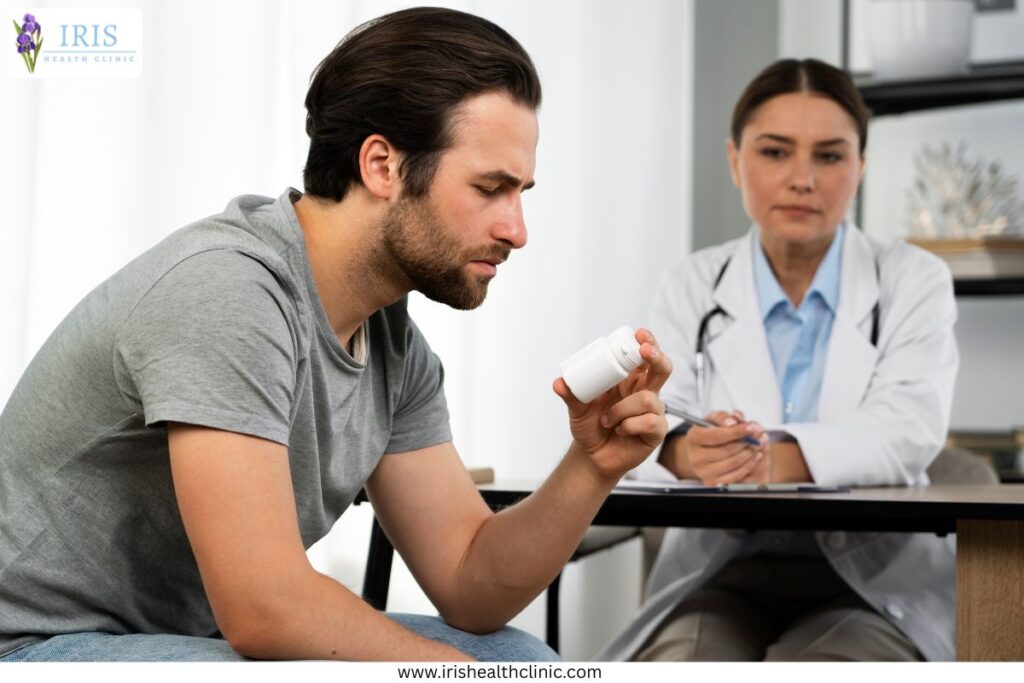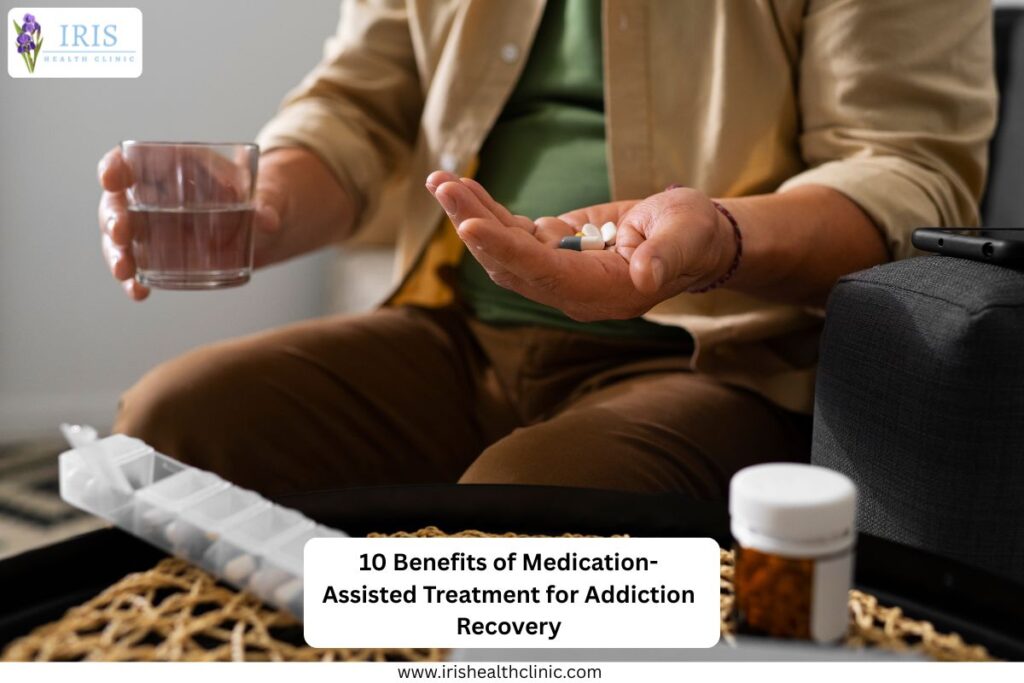Let’s be honest, recovering from addiction is tough. Cravings hit hard. With withdrawal being so tiring, sometimes staying sober seems impossible. And that is the place where Medication Assisted Treatment (MAT) can really make a difference.
It does not just manage symptoms but balances your body and mind so that your focus can go into building a healthier, more stable life. From taking away the cravings to ensuring long-term stability, the benefits of MAT are obvious and make recovery feasible, and Iris Health Clinic is here to help you every step of the way.
What are the 10 ways in which MAT can transform the road to sobriety?
1. Does medication-assisted treatment actually make recovery easier?
Medication-assisted treatment for substance use disorders is considered one of those approaches to curb substance users’ cravings and decrease the effects of withdrawal symptoms. In some way, medications such as buprenorphine, methadone, or naltrexone stabilize brain chemistry so that an individual would feel balanced both physically and emotionally. Such stabilization gives the individual time to engage in therapy, begin healthier habits, and start the process of rebuilding his or her life without the continual pressure of intense urges.
2. Does MAT reduce the chances of relapse?
When cravings are just too strong to resist, one relapses. MAT controls the cravings, and it blocks the pleasurable effects of the substance. When getting high or getting drunk is no longer that rewarding, people become more interested in putting down the path for recovery. When they become steadier and obstacles in long-term recovery lessen, they grow strong in their belief that they are going for long-term abstinence.
3. Can MAT increase participation and success in treatment programs?
People in recovery are frequently unable to maintain engagement in therapy when the withdrawal is intense. MAT allows the person an easier form of treatment and encourages them to participate consistently. Those who remain longer in the treatment have a greater chance of developing long-term coping skills, learning life skills, and maintaining recovery.
4. How does Medication Assisted Treatment Milwaukee improve access to recovery?
Medication Assisted Treatment Milwaukee gives people in Wisconsin access to local care. Since the treatment is nearby, clients do not get delayed by travelling, thus making it easier to start programs promptly and sustain support. This accessibility will allow for more sustained engagement and great success.
5. How does MAT maintain physical health during recovery?
Addiction is a way to injure the body through infections, organ damage, or just life-threatening overdoses. By stabilizing substance use, MAT lowers these risks. People on MAT experience fewer emergent visits and medical complications and can thus focus on potential wellness and long-term recovery.
6. Are there any co-occurring mental health problems that MAT can treat?
Often, anxiety, depression, and trauma come coupled with people who end up facing addiction. MAT provides the stability that allows an individual to engage actively in therapy and mental health treatment. Now that cravings and withdrawal no longer dominate the person’s life, the healing of emotions can start, coping strategies can be created, and resilience can be built up, thereby supporting fuller restoration.

7. How does medical-assisted treatment for alcohol support sobriety?
Medical-assisted treatment for alcohol includes medications that reduce cravings, block alcohol’s rewarding effects, or create unpleasant reactions if alcohol is consumed. These medications help people stay sober so they can focus on therapy, lifestyle changes, and repairing relationships. MAT for alcohol helps people keep a clean lifestyle for the long term.
8. Can MAT help in regaining independence in daily life?
By taking charge of people’s daily decisions, addiction leaves no space for independence. MAT offers an alternative for regaining independence by controlling cravings and withdrawal symptoms. People return to work, reconnect with family and friends, and do things for themselves either for pleasure or for personal goals. This regained control is crucial in the establishment of a meaningful life that runs beyond addiction.
9. Will MAT create long-term stability in recovery?
An MAT program provides more than transient relief; it develops long-term recovery. Because cravings are held in check and withdrawal symptoms removed, an individual is less prone to repeat the problem and able to maintain healthy patterns of behavior. Thus, long-term stability enables social relationships, career and educational goals, and a safer, predictable lifestyle.
10. How does MAT give the power to individuals to take charge of their own recovery process?
Among other things, perhaps the greatest advantage of MAT is this: it gives individuals a sense of empowerment. Addiction can make people feel imprisoned; however, MAT gives them control over their physical symptoms and emotional well-being. When adequately prepared, the person can participate actively in therapy, build practical goals, and see a life apart from addiction. Through MAT, recovery becomes something real to nurture.
Conclusion
Medication-assisted treatment can make recovery feel possible instead of daunting. Through extinguishing cravings and relapse, promoting mental and physical health, and offering a kind of control over one’s life, real practical benefits are offered through MAT to the patient. If you have decided to take the next step toward lasting recovery, then contact Iris Health Clinic today and begin your journey toward permanent sobriety.
FAQs
1. What are the benefits of medication-assisted treatment?
MAT supports recovery from substance use disorders by restoring a functional brain state, thereby ameliorating withdrawal symptoms and curbing craving. Another set of complementary effects of MAT is health improvement, thereby lowering overdose and infection risks. Remaining engaged in treatment throughout the recovery process occurs with the efficacy of MAT, which also allows one to restore social and everyday functional capacities, while at the same time helping to reduce their criminal activities towards long-term recovery.
2. Why is medication therapy management beneficial?
Medication Therapy Management ensures that medications are disposed of appropriately for relative improvement in health and protection. In fulfilling its function, MTM improves medical outcomes and prevents complications by reviewing prescriptions, alerting to problems, and reviewing treatment plans. This management effort also stimulates a drop in healthcare-related expenses by way of avoiding medication errors, adverse effects, and misplaced treatments.
3. Is MAT safe to use?
Yes. Medication-Assisted Therapy is safe, especially when managed by health care providers. It uses medications that are approved for cravings and to address withdrawal, to promote recovery, and ultimately lower risks while in treatment.

